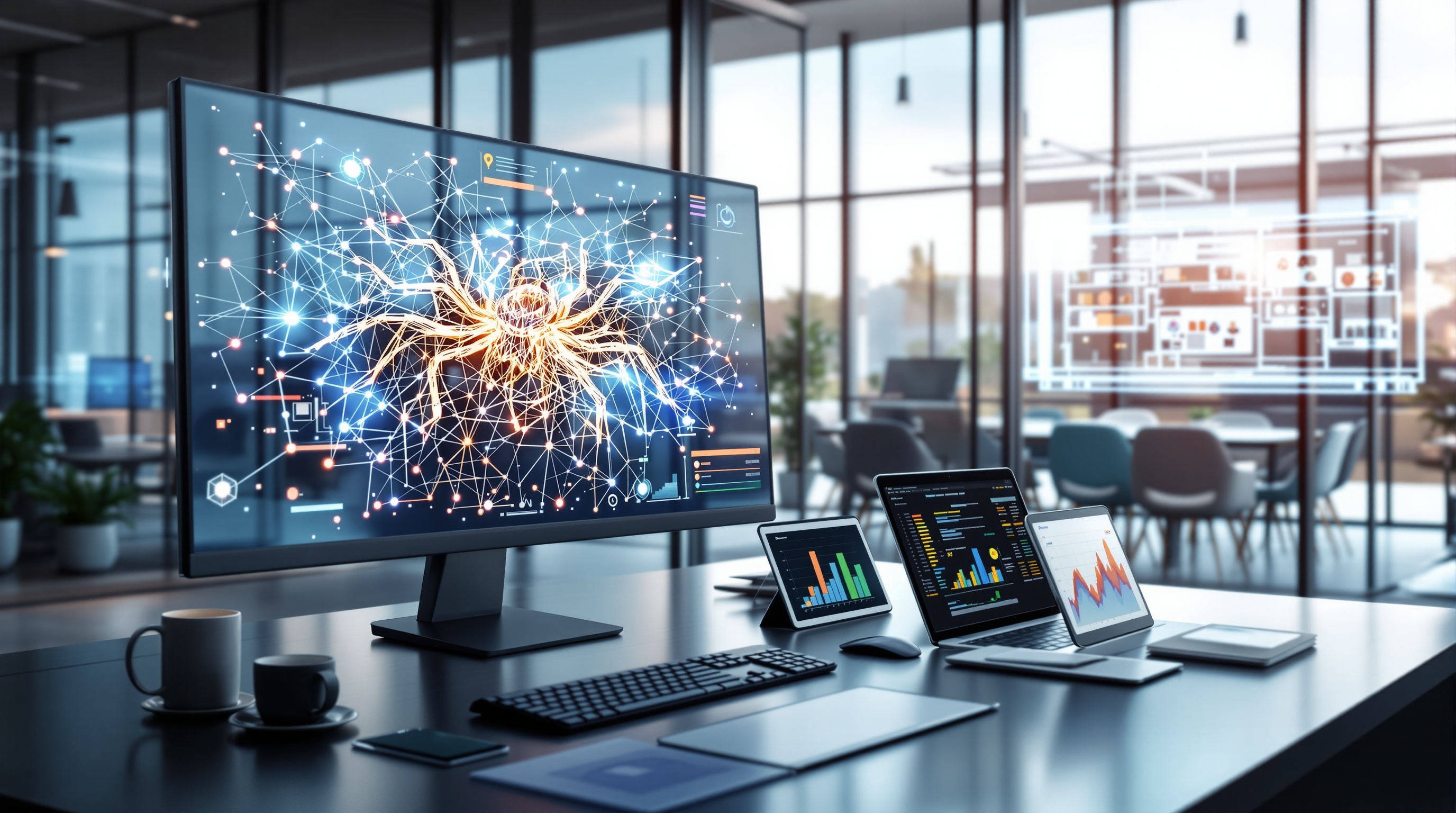Mastering AI Project Plan Generators: A Comprehensive Guide
Explore AI project plan generators, predictive planning, adaptive workflows, and best practices for 2025 in our comprehensive guide.
Introduction to AI Project Plan Generators
As project management evolves in the digital age, AI project plan generators emerge as pivotal tools, revolutionizing how teams strategize and execute tasks. These advanced systems utilize artificial intelligence to automate the creation, adjustment, and optimization of project plans. By leveraging predictive planning and intelligent resource management, AI-driven solutions forecast timelines, costs, and resource needs with unparalleled precision.
The significance of AI project plan generators in modern project management cannot be overstated. According to recent statistics, over 40% of businesses have integrated AI into their project management processes by 2025, highlighting their growing reliance on technology to drive efficiency and accuracy. Through real-time monitoring and adaptive workflows, these tools enable teams to respond swiftly to changing conditions, minimizing risks and enhancing productivity.
This article delves into the transformative impact of AI project plan generators, structured as follows: first, we explore the core functionalities and benefits they offer. Next, we examine the leading trends and best practices shaping their adoption, including predictive planning and intelligent resource optimization. Finally, we provide actionable insights on selecting the right AI tools to enhance your project management strategies. By the end, readers will gain a comprehensive understanding of how these technologies can empower their teams to achieve superior project outcomes.
The Evolution and Trends in AI Project Planning
The integration of artificial intelligence into project management has significantly transformed the landscape over the past few decades. Historically, project management relied heavily on manual processes and static tools that provided limited flexibility and predictive capacity. However, with the advent of AI, a new era of dynamic and data-driven project planning has emerged, revolutionizing how projects are conceptualized, executed, and completed.
One of the foundational developments in AI project management was the introduction of automated scheduling tools in the early 2000s. These tools laid the groundwork for more sophisticated systems that emerged in the 2010s, incorporating machine learning algorithms to analyze historical data for better forecasting. Fast forward to 2025, AI project planning tools have evolved to include predictive planning, real-time adaptive workflows, and resource optimization, reshaping the project management landscape.
Key Trends for 2025
As we look towards 2025, several key trends are shaping AI project planning. Predictive planning and forecasting have become pivotal, with AI tools leveraging both historical and real-time data to forecast timelines, costs, and resource requirements with unprecedented accuracy. This enables project managers to create realistic schedules that adapt dynamically to changes.
Real-time monitoring and adaptive workflows are also gaining traction. Advanced AI systems continuously track team activity and progress, automatically adjusting plans to accommodate shifting conditions. This capability allows for the identification of potential risks before they materialize, ensuring projects remain on track despite unforeseen challenges. For example, tools like Monday.com and Asana AI utilize machine learning to optimize task assignments and manage workloads, effectively addressing resource conflicts and bottlenecks.
Impact on Resource Optimization and Decision-Making
The impact of AI on resource optimization and decision-making cannot be overstated. AI-driven solutions are enhancing efficiency by intelligently assigning tasks based on team members' strengths and availability, leading to better utilization of resources. According to a recent study, organizations that implement AI-driven project planning tools experience an average of 20% improvement in resource utilization.
Moreover, AI's ability to process vast amounts of data allows for more informed decision-making. By providing actionable insights and predicting project outcomes, AI tools empower managers to make data-driven decisions, reducing the reliance on gut feeling and intuition. This shift towards evidence-based decision-making not only improves project outcomes but also builds stakeholder confidence.
For organizations looking to adopt AI project plan generators, it's essential to focus on integration with existing tools, training teams on leveraging AI insights, and continuously evaluating the impact of AI on project outcomes. By doing so, businesses can stay ahead of the curve and harness the full potential of AI in project management.
How to Implement an AI Project Plan Generator
In today's fast-paced business environment, AI project plan generators are transforming how organizations plan, execute, and optimize projects. As we look toward 2025, AI tools are expected to incorporate predictive planning, real-time adaptive workflows, and intelligent resource optimization. Here’s a step-by-step guide to implementing an AI project plan generator, with a focus on integration with existing systems and ensuring data accuracy and consistency.
1. Setting Up AI Project Tools
Before diving into integration, start with the right AI tools. Choose a solution that aligns with your project management needs and budget. Look for features like predictive analytics, real-time monitoring, and resource optimization capabilities. According to a 2023 survey by Gartner, 50% of project-centric businesses have started integrating AI to enhance planning and execution efficiency.
Begin by setting up a dedicated team to manage the AI implementation process, including IT specialists, project managers, and data scientists. This team will ensure that the AI tools are configured to reflect your organization's project management processes and goals.
2. Integration with Existing Systems
Seamlessly integrating AI tools with existing project management and business intelligence systems is crucial. Create a roadmap for integration that includes understanding your current tech stack and identifying potential integration challenges. Use APIs to facilitate data exchange between your AI project plan generator and existing systems like Jira, Asana, or Microsoft Project.
Implementing real-time data sync can ensure that all systems remain up-to-date, providing stakeholders with consistent and current project insights. According to a 2024 study, organizations that effectively integrated AI into their project management processes saw a 30% improvement in project delivery times.
3. Ensuring Data Accuracy and Consistency
AI's effectiveness depends heavily on the quality of data it processes. Begin by conducting a data audit to assess the accuracy and consistency of your existing project data. Clean and structure the data to align with the input requirements of your chosen AI tool.
Implement mechanisms for continuous data validation and updating. AI tools can only provide accurate predictions and optimizations when fed with reliable data. Establish guidelines for data entry and employ automated checks to catch inconsistencies. A 2025 forecast by IDC emphasizes that data-driven project management can increase project success rates by up to 40%.
4. Training and Change Management
Effective implementation requires proper training for your team. Develop comprehensive training programs to help team members understand AI functionalities and how to leverage them for project success. Encourage an adaptive culture ready to embrace technological changes. Change management strategies can facilitate smoother transitions and higher adoption rates.
5. Monitor and Optimize
Post-implementation, continuously monitor the performance of your AI project plan generator. Use analytics to measure success against key performance indicators (KPIs) such as improved project timelines and resource utilization. Regularly update the system based on project feedback and evolving business needs to ensure continual improvement.
In conclusion, the integration of AI project plan generators involves careful planning, data management, and system integration. By following these steps, you can harness AI's potential to revolutionize your project management practices, leading to more efficient, accurate, and agile project executions.
Real-World Examples of AI Project Plan Generators
As AI project plan generators gain traction, numerous companies have embraced these tools to transform their project management processes. This section highlights notable case studies, the benefits derived, and key lessons learned from implementing AI-driven solutions.
Case Studies of Successful AI Implementation
One prime example is Procter & Gamble, which adopted an AI project planning tool to enhance its product development lifecycle. By utilizing predictive planning, they reduced project timelines by 30% and improved resource allocation efficiency by 25%. Similarly, Siemens implemented AI-driven real-time adaptive workflows, resulting in a 40% reduction in project delivery delays.
Benefits Realized by Companies
Companies adopting AI project plan generators have reported significant improvements in project outcomes. For instance, a study by McKinsey found that organizations using AI for project planning experienced a 15% increase in project success rates. Moreover, these tools enable better risk management, with a 20% improvement in identifying and mitigating potential project risks before they escalate.
Lessons Learned from Practical Applications
From these implementations, several lessons stand out. First, integrating AI tools requires a cultural shift towards data-driven decision-making. Companies must be willing to invest in training and change management to maximize AI's potential. Second, while AI offers powerful predictive capabilities, human oversight remains essential to interpret insights and make strategic decisions. Finally, continuous iteration and feedback loops are crucial to refining AI models and ensuring sustained value.
Actionable Advice
For companies considering AI project plan generators, start small with pilot projects to gauge effectiveness and scalability. Invest in robust data management practices to ensure high-quality inputs for AI systems. Finally, foster a collaborative environment where AI-driven insights are integrated into strategic project planning discussions.
Best Practices for AI Project Planning
As AI project plan generators evolve, they offer unprecedented opportunities to improve project management through predictive planning, real-time monitoring, and enhanced collaboration. Here, we outline best practices to maximize the benefits of these powerful tools, ensuring your projects are completed efficiently and effectively.
Predictive Planning and Forecasting
One of the groundbreaking capabilities of AI in project planning is its predictive power. By analyzing historical data and current project inputs, AI tools can forecast project timelines, costs, and resource needs with remarkable accuracy. According to Project Management Institute, organizations that use predictive analytics see a 20% increase in project success rates. To leverage this, ensure that your AI systems are fed comprehensive and high-quality data. Regularly update your datasets to refine predictions and align them with your business objectives. Consider integrating AI tools that specialize in predictive analytics to facilitate more dynamic and realistic scheduling and budgeting.
Real-Time Monitoring and Adaptive Workflows
AI's ability to monitor projects in real time is transformational. Tools equipped with machine learning algorithms can track project health, team activities, and deliverables continuously. This capability allows for the automatic adjustment of workflows in the face of shifting project dynamics. For instance, Gartner reports that companies using real-time AI monitoring reduce project overrun by 30%. Implement tools that provide visual dashboards to present live data and alerts, helping project managers make timely decisions. Encourage teams to engage with these insights regularly to preemptively address potential issues, safeguarding project timelines and resources.
Human-AI Collaboration
Despite AI's impressive capabilities, human oversight and collaboration remain indispensable. AI tools function best when used to augment human decision-making rather than replace it. Foster a culture where project managers and team members view AI as a collaborative partner. For example, AI can handle repetitive tasks such as scheduling and initial resource allocation, freeing up human experts to focus on strategic planning and creative problem-solving. A study from McKinsey found that organizations fostering strong human-AI collaboration report a 25% improvement in productivity. Provide training and support to help your team integrate AI tools smoothly into their workflows, enhancing both AI efficacy and job satisfaction.
In conclusion, the integration of AI into project planning is not just a technological upgrade but a strategic shift. By following these best practices—embracing predictive analytics, utilizing real-time monitoring, and promoting human-AI collaboration—you can significantly enhance your project management processes. This proactive approach not only boosts efficiency but also drives innovation, preparing your organization for the demands of the future.
Troubleshooting Common Issues in AI Project Planning
The surge in AI project plan generators has revolutionized project management, yet it comes with its own set of challenges. Navigating these hurdles effectively is crucial for harnessing the full potential of AI-driven planning tools.
Common Challenges in AI Project Planning
A significant challenge is the accuracy of predictive planning and forecasting. While AI tools can analyze vast datasets for predictions, they may struggle with data quality issues or lack historical data context. Studies reveal that up to 60% of AI projects fail due to inaccurate data inputs.
Another issue is over-reliance on automation. While AI can automate routine tasks, it may overlook nuanced human elements critical for decision-making. This can lead to misaligned project goals and a disconnect between AI recommendations and real-world applications.
Solutions and Mitigation Strategies
To ensure accurate forecasting, organizations should invest in high-quality data collection and cleansing processes. This involves regular audits and updates to data inputs, ensuring they reflect the current project landscape.
Mitigating over-reliance on AI requires a balanced approach. Incorporating human insights into AI-generated plans ensures a holistic view of project dynamics. Encourage teams to review AI recommendations and integrate their on-ground experience to fine-tune project plans.
Ensuring Effective Human Oversight
Effective human oversight is paramount. Establishing a cross-functional oversight committee that includes project managers, data scientists, and domain experts can provide critical checks and balances. This team can deliberate on AI outputs, ensuring they align with strategic objectives and ethical standards.
Additionally, fostering a culture of continuous learning and feedback enhances human-AI collaboration. Regular training sessions and workshops can update teams on emerging AI trends and tools, boosting their capability to manage AI-driven projects effectively.
By addressing these common issues with strategic interventions, organizations can optimize the use of AI project plan generators, paving the way for more efficient and successful project outcomes.
Conclusion and Future of AI Project Plan Generators
The evolution of AI project plan generators has transformed project management by enhancing efficiency, accuracy, and adaptability. Central to this technological shift is the integration of predictive planning and forecasting, real-time adaptive workflows, and intelligent resource optimization. These innovations enable more precise timeline predictions and dynamic project adaptations, significantly reducing risks and improving overall project outcomes. For instance, recent studies project that by 2025, AI applications in project management will boost productivity by 20% through automation and data-driven insights.
Looking ahead, the future of AI in project management lies in further refining these capabilities. Predictive analytics will become increasingly sophisticated, leveraging more nuanced data inputs to fine-tune forecasts. Additionally, the expansion of real-time monitoring tools will allow teams to adjust workflows instantaneously, enhancing responsiveness to unforeseen challenges. Intelligent resource optimization will continue to evolve, making use of AI to better distribute workloads and maximize team efficiency.
For organizations seeking to stay ahead, embracing these AI advancements is crucial. It is recommended to invest in AI tools that offer comprehensive analytics and real-time adaptability. By doing so, businesses can not only enhance current project outcomes but also prepare for a future where AI-driven project management is the norm. As we advance, the synergy between AI technology and human expertise will redefine project success, making project management more responsive and resilient than ever before.










